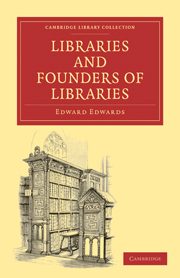Book contents
- Frontmatter
- PREFACE
- Contents
- LIBRARIES, AND THE FOUNDERS OF LIBRARIES
- CHAPTER I INTRODUCTORY.—THE ANCIENT LIBRARIES OF EGYPT, OF JUDÆA, OF GREECE, AND OF THE ROMAN EMPIRE
- CHAPTER II INTRODUCTORY. — MEDIÆVAL AND MODERN LIBRARIES. — ANTICIPATORY SURVEY OF THE SUBJECT, IN GENERAL
- CHAPTER III OF SOME LIBRARIES OF MONASTERIES ABROAD
- CHAPTER IV OF SOME LIBRARIES OF MONASTERIES AT HOME
- CHAPTER V CONCERNING THE LIBRARIES OF SOME FAMOUS AUTHORS, OF VARIOUS PERIODS
- CHAPTER VI CONCERNING THE LIBRARIES OF SOME CELEBRATED MONARCHS AND ROYAL PERSONAGES, OF VARIOUS PERIODS
- CHAPTER VII HISTORY OF THE OLD ROYAL LIBRARY OF THE KINGS OF ENGLAND
- CHAPTER VIII HISTORY OF THE STATE PAPER OFFICE
- CHAPTER IX HISTORY OF THE PUBLIC RECORDS OF THE REALM, IN THEIR EARLY PERIOD OF GROWTH AND SEPARATE CUSTODY
- CHAPTER X THE LIFE OF THOMAS PARKER, EARL OF MACCLESFIELD.—THE LIFE OF NICHOLAS JOSEPH FOUCAULT.—HISTORY AND DESCRIPTION OF THE LIBRARY AT SHIRBURN CASTLE IN OXFORDSHIRE
- CHAPTER XI THE LIFE OF CHARLES SPENCER, THIRD EARL OF SUNDERLAND. — HISTORY AND DESCRIPTION OF THE LIBRARY AT BLENHEIM PALACE
- CHAPTER XII THE PUBLIC LIFE OF GEORGE JOHN, SECOND EARL SPENCER.—HISTORY AND DESCRIPTION OF THE SPENCER LIBRARY AT ALTHORP
- APPENDIX A LIST AND DESCRIPTION OF EXTANT CATALOGUES OF ENGLISH MONASTIC LIBRARIES, DISTINGUISHING THE UNPRINTED FROM THE PRINTED
- APPENDIX B NOTE ON THE LIBRARY OF KING EDWARD THE SIXTH
- APPENDIX C SUMMARY CLASSIFICATION AND SYNOPTICAL VIEW OF THE PUBLIC RECORDS OF THE REALM
- Plate section
CHAPTER I - INTRODUCTORY.—THE ANCIENT LIBRARIES OF EGYPT, OF JUDÆA, OF GREECE, AND OF THE ROMAN EMPIRE
Published online by Cambridge University Press: 10 November 2010
- Frontmatter
- PREFACE
- Contents
- LIBRARIES, AND THE FOUNDERS OF LIBRARIES
- CHAPTER I INTRODUCTORY.—THE ANCIENT LIBRARIES OF EGYPT, OF JUDÆA, OF GREECE, AND OF THE ROMAN EMPIRE
- CHAPTER II INTRODUCTORY. — MEDIÆVAL AND MODERN LIBRARIES. — ANTICIPATORY SURVEY OF THE SUBJECT, IN GENERAL
- CHAPTER III OF SOME LIBRARIES OF MONASTERIES ABROAD
- CHAPTER IV OF SOME LIBRARIES OF MONASTERIES AT HOME
- CHAPTER V CONCERNING THE LIBRARIES OF SOME FAMOUS AUTHORS, OF VARIOUS PERIODS
- CHAPTER VI CONCERNING THE LIBRARIES OF SOME CELEBRATED MONARCHS AND ROYAL PERSONAGES, OF VARIOUS PERIODS
- CHAPTER VII HISTORY OF THE OLD ROYAL LIBRARY OF THE KINGS OF ENGLAND
- CHAPTER VIII HISTORY OF THE STATE PAPER OFFICE
- CHAPTER IX HISTORY OF THE PUBLIC RECORDS OF THE REALM, IN THEIR EARLY PERIOD OF GROWTH AND SEPARATE CUSTODY
- CHAPTER X THE LIFE OF THOMAS PARKER, EARL OF MACCLESFIELD.—THE LIFE OF NICHOLAS JOSEPH FOUCAULT.—HISTORY AND DESCRIPTION OF THE LIBRARY AT SHIRBURN CASTLE IN OXFORDSHIRE
- CHAPTER XI THE LIFE OF CHARLES SPENCER, THIRD EARL OF SUNDERLAND. — HISTORY AND DESCRIPTION OF THE LIBRARY AT BLENHEIM PALACE
- CHAPTER XII THE PUBLIC LIFE OF GEORGE JOHN, SECOND EARL SPENCER.—HISTORY AND DESCRIPTION OF THE SPENCER LIBRARY AT ALTHORP
- APPENDIX A LIST AND DESCRIPTION OF EXTANT CATALOGUES OF ENGLISH MONASTIC LIBRARIES, DISTINGUISHING THE UNPRINTED FROM THE PRINTED
- APPENDIX B NOTE ON THE LIBRARY OF KING EDWARD THE SIXTH
- APPENDIX C SUMMARY CLASSIFICATION AND SYNOPTICAL VIEW OF THE PUBLIC RECORDS OF THE REALM
- Plate section
Summary
“Inde tenore pari, gradibus sublimina celsis
Ducor ad intonsi Candida templa Dei.
Signa peregrinis ubi sunt alterna columnis
Belides, et stricto barbarus ense pater:
Quæque viri docto veteres cepere novique
Pectore, lecturis inspicienda patent……
Quærentem frustra custos me, sedibus illis
Præpositus, sancto jussit abire loco……
Nec me, quæ doctis patuerunt prima libellis,
Atria Libertas tangere passa sua est.
In genus auctoris miseri fortuna redundat;
Et patimur nati, quam tulit ipse, fugam.”
Tristia, iii, 1.Of the Libraries of the Ancients, the accounts that have descended to us are meagre and unsatisfactory. Some of the authors, to whom we owe such knowledge as we have, are either Encyclopædists, or geographers, or poets, intent on higher or on wider themes, and therefore treating of Libraries in a fashion merely incidental. Others of them derived their own knowledge at second-hand. Living, it may be, in the second or third centuries, and in Italy, we find them more communicative about the Libraries of the Ptolemies and of the Attali, than about the collections which lay almost at their own doors. The usual authorities, in a word, are but rarely bending their main attention to this particular subject. Still more rarely are they eye-witnesses of the facts for which they are made to vouch.
What can now be stated on this opening part of our theme,—and it must needs be stated briefly,—will, therefore, wear a fragmentary and hypothetical aspect. Too frequently, I fear, it will be but the abridgement of an oft- told tale. I begin by noticing the Libraries of Egypt.
- Type
- Chapter
- Information
- Libraries and Founders of Libraries , pp. 3 - 21Publisher: Cambridge University PressPrint publication year: 2010First published in: 1864



